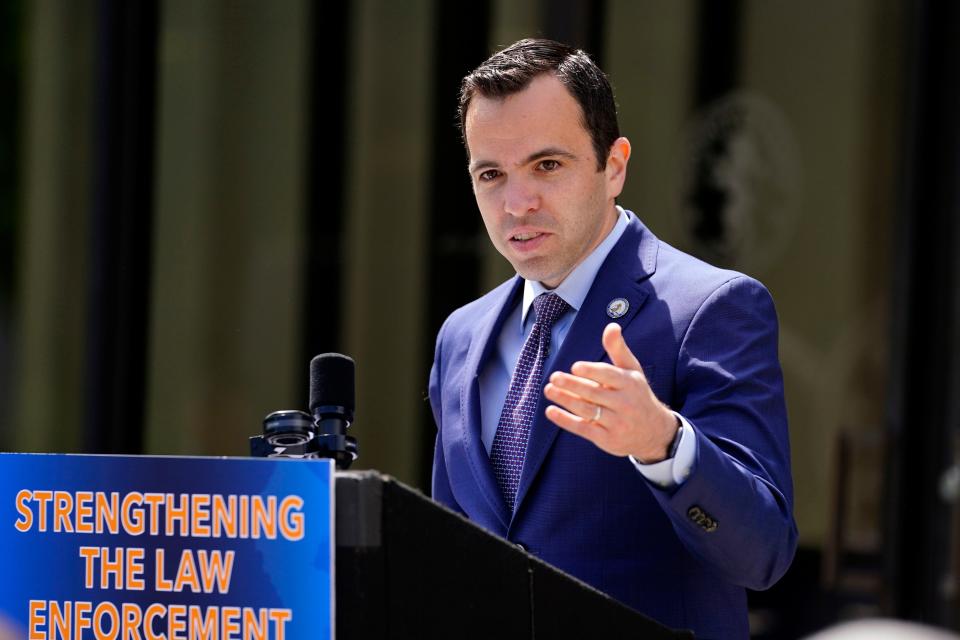Attorney general won't pair cops with mental health pros on Paterson 911 calls
- Oops!Something went wrong.Please try again later.
PATERSON — Facing criticism from local social justice activists, the New Jersey Attorney General’s Office won't have Paterson police officers team up with mental health professionals on 911 calls.
The program, called Arrive Together, won praise in a study earlier this year by the Brookings Institution — a nationally prominent research group — as a way to defuse volatile encounters between cops and people going through emotional crisis. The Brookings study highlighted and praised the Arrive Together model that had cops and mental health professionals respond to emotion distress 911 calls as teams.

But after the fatal Paterson police shooting of Najee Seabrooks on March 3, activists faulted the Arrive Together program because of its law enforcement involvement and asserted that mental health workers should go out on those 911 calls without cops.
What is Platkin's plan?
Attorney General Matthew Platkin last Friday announced his plan for Paterson’s Arrive Together — one that will not pair up cops and mental health workers on 911 calls.
“Today, ARRIVE includes several models operating across the State, with the model used in each community tailored to each community’s unique needs and resources,” Platkin’s press release said. “After input from law enforcement officials, mental health providers, and community leaders, Paterson’s pilot model is three-fold.”
Platkin’s plan will have Paterson police officers giving referrals to people in mental distress, send NJ Transit police with staff from a nonprofit health care provider named CBH Care to conduct outreach at the Paterson bus terminal, and have the same health provider research Paterson’s emergency dispatch calls to come up with an alternative mental health 911 call response program that would not involve law enforcement.
The Attorney General's Office said the outreach at the bus terminal would happen one day per week at first, “then build from there.”
The announcement did not say how long it would take to craft an alternative plan for Paterson’s 911 mental health calls.
Since Arrive Together started as a pilot project in a few parts of New Jersey in 2021, there have been “nearly 2,000 interactions,” the Attorney General's Office said.
"More mental health resources will only be a good thing for the citizens of Paterson,” said a spokesman for the attorney general.
St. Joseph’s University Medical Center already has a crisis intervention team that goes to the scene when the hospital gets calls about people going through mental health crises.
The hospital’s CEO, Kevin Slavin, said in the aftermath of Seabrooks’ death that St. Joseph’s crisis team should have been called in that case. But after Slavin issued his statement, Paterson cops began noting in their official police reports instances when the hospital team was not available to respond to calls about cases in which armed individuals were going through emotional distress.
Platkin’s press release talked about expanding Arrive Together beyond the original model of a combined response by cops and counselors.
What about 'Connect and Protect'?
Mayor Andre Sayegh still wants to launch his own version of the cop and counselor co-responder model for 911 mental health calls, said his chief of staff, Habib Kader. The city got a $550,000 federal grant in 2022 for the “Connect and Protect” program.
But there has been very little progress in making Connect and Protect happen, and its prospects seem uncertain considering Platkin's takeover of the Paterson Police Department. Sayegh and the Attorney General's Office have been at odds since then.
A spokesman for the attorney general said the Paterson Police Department “will coordinate the designing” of Connect and Protect in the city, but he did not provide a time frame.
Paterson Black Lives Matter leader Zellie Thomas and Paterson Healing Collective director Liza Chowdhury were among the activists who asserted that cops should not be part of the Arrive Together program.
Chowdhury could not be reached for comment for this story. Thomas was less than impressed by the attorney general's press release on Friday.
“Sadly, the Attorney General's Office is one of the reasons why the community doesn't trust law enforcement,” Thomas said.
Joe Malinconico is editor of Paterson Press. Email: editor@patersonpress.com
This article originally appeared on NorthJersey.com: Paterson NJ: Arrive Together program altered, attorney general says

